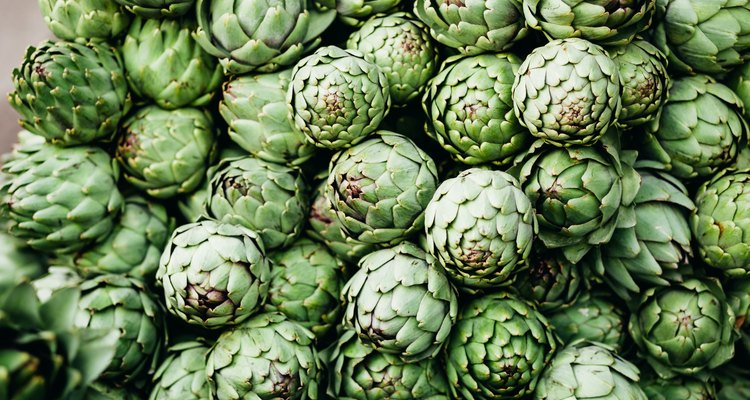
shevtsovy/iStock/Getty Images
Artichokes are commonly eaten steamed, boiled, braised or fried, but raw artichokes can actually be a simple way of preparing these delicious and nutrient-rich vegetables. Artichokes naturally contain antioxidants, such as flavonoids, which, along with certain vitamins, such as vitamin C, are heat-sensitive. Thus, eating raw artichokes might be the best way for you to get the most nutritional value possible.
Choosing Your Artichoke
According to Mark Bittman, columnist for "The New York Times" and author of “How To Cook Everything Vegetarian,” the most important factor in choosing an artichoke that you plan on eating raw is freshness. Otherwise, the variety doesn’t matter, although young artichokes will have more tender leaves, which can make them easier to prepare and to eat.
How to Eat It
You can use the heart for raw salads, or you can eat the artichoke as you would a steamed one -- whole, leaf-by-leaf, followed by the heart and stem. To eat a whole raw artichoke, remove the leaves individually and scrape with your teeth to remove the leaf. When you reach the heart, you need to remove the choke -- the prickly part at the center. You remove it by cutting away at the base, although sometimes you can simply spoon it out. You can then eat the heart and stem as is. For a raw artichoke salad, use only the heart, sliced into thin pieces and dressed with lemon juice to prevent browning. You can keep some of the leaves for a garnish, or eat them on their own as a tasty snack.
Nutritional Profile of Raw Artichokes
A single, medium-sized globe artichoke has only 60 calories per serving and minimal amounts of fat. It is also a rich source of a number of essential minerals and vitamins, particularly potassium and phosphorus. It contains 9.6 to 16 percent of the recommended dietary intake of phosphorus and 10 percent of the recommended dietary intake of potassium per serving. Phosphorus helps your body build strong bones and teeth, while potassium is needed to regulate your heart’s electrical activity, build muscle and maintain your body’s acid-base balance. Raw artichokes are also a good source of vitamin C, providing between 12.5 and 20 percent of the daily dietary intake for adults. Vitamin C is used to make collagen, an essential protein for healthy skin, tendons, ligaments and blood vessels.
Dietary Fiber Content
Raw artichokes are naturally high in dietary fiber, which can help prevent overeating as it makes you feel fuller faster. A single medium artichoke has 6.9 grams of dietary fiber, which is between 18 and 27.6 percent of your daily recommended intake. This percentage is especially high given the relatively small serving size of a single artichoke. A diet high in dietary fiber is also important for maintaining good colon and digestive system health, as it can prevent constipation, hemorrhoids or diverticulosis. Dietary fiber has also been shown to help reduce blood cholesterol levels.
Related Articles
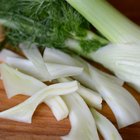
How to Eat Fennel Raw
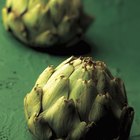
How to Parboil Artichokes
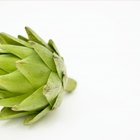
How to Cook an Artichoke on the Stove
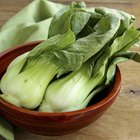
Bok Choy Nutrition
The Best Way to Cook Large Artichokes
How Do I Clean Water Cress?
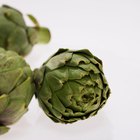
How to Cook Frozen Artichokes

What Is the Nutritional Value of ...
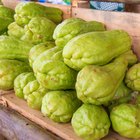
How to Chop Chayote
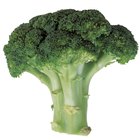
Can I Eat Broccoli's Stem?

Peeling the Spiny Chayote Squash

How to Make a Corsage for a Man
How to Freeze Bok Choy

Juicing for Wrinkles
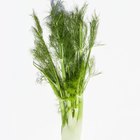
How to Julienne Fennel

How to Dry Artichokes

How to Devein Tiger Prawns
How to Juice Beet Stalks
How to Roast Celery

How to Blanch Tomatillos
References
- USDA National Nutrient Database: Artichokes, Raw
- The New York Times: Eating a Raw Artichoke
- How to Cook Everything Vegetarian: Simple Meatless Recipes for Great Food; Mark Bittman
- Journal of Agricultural and Food Chemistry: In Vitro Antioxidant Activities of Edible Artichoke (Cynara Scolymus L.) and Effect on Biomarkers of Antioxidants in Rats
- MedlinePlus: Phosphorus in Diet
- University of Maryland Medical Center: Potassium in Diet
- University of Maryland Medical Center: Vitamin C (Ascorbic Acid)
Writer Bio
Jessica Hendricks has worked as a professional journalist for CBS and ABC News in the areas of health, fitness and nutrition. Passionate about wine, she has also worked for several food and drink publications. She holds three master's degrees in Eastern European culture, journalism and nutrition and dietetics.
Photo Credits
shevtsovy/iStock/Getty Images